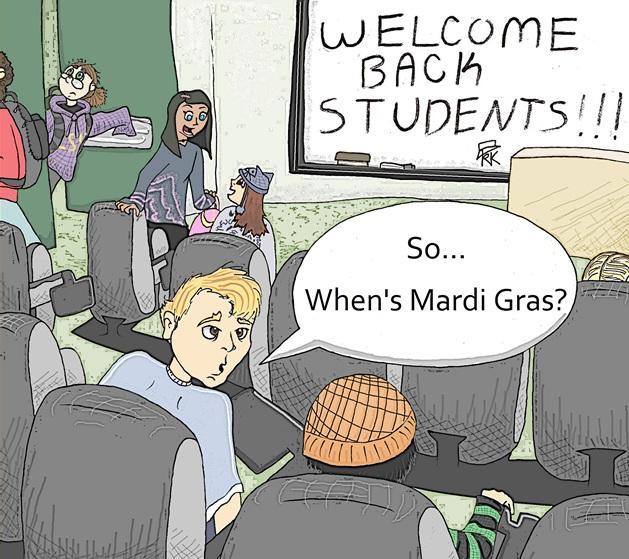Assuming students admitted to our University can read, syllabus day (or week) is an insult to our intelligence, a monumental waste of time, and a carbon-footprint-increasing requirement that should push tree-huggers worldwide into a blinding, protest-inducing rage.
Now beginning my eighth semester here, I’ve sat through my share of syllabus days. On one occasion, a professor handed out a five-page printed syllabus, read over it, and then pulled up an uninspiring black-and-white PowerPoint which covered the same things almost word-for-word before letting us out an hour early.
Another time, the professor handed out the syllabus and proceeded to audibly enunciate the words on its pages — an absurdly boring introduction and poor incentive to encourage future attendance. One brave instructor even warned us how mind-numbingly uninteresting the course would be, using the word “boring” at least five times in 50 minutes.
She should receive a promotion.
Is that what our rising tuition pays for?
I drew up a syllabus week survey on Monday and shared it on my Facebook timeline. Of the 21 responses, about half reported their first day of class went something along the lines of this: Show up, find out that nearly everyone in the class goes by a nickname, read a syllabus and get out at least 15 minutes early.
Don’t blame the professors, though.
They’re only adhering to University policy, which requires all instructors to distribute written syllabi in their courses, both graduate and undergraduate. The policy essentially ensures throwing away the first day of class into the growing dumpster of University inefficiencies.
Chemistry instructor John Hogan usually outlines the architecture of his course on the first day and lectures “a little bit.” Although he doesn’t consider syllabus day a waste of time, he does abhor time-wasting in general, such as those feeling entitled to give pre-class announcements on, for sake of argument, the American Institute of Chemical Engineers’s riveting latest happenings.
Sure, students who consider the first couple weeks a browsing session could argue diving headfirst into relevant material may put them at a disadvantage if they end up switching classes before the University’s designated add course for credit date (Thurs, Jan. 24 at 4:30 p.m.), roughly two weeks from the first day of classes.
But like I said, we can’t blame professors.
“I’m not unreasonable for a student that adds late,” said English instructor Eric Schmitt. “I try not to cover too much too quickly, just to kind of be prudent on that. But, on the other hand, I don’t feel any responsibility to wait to cover material so that students can shop around.”
Therefore, most of our problems could be solved before the sun ever comes up on that first day of school.
Suggestion numero uno: Alter policy by requiring professors to upload electronic, downloadable syllabi onto Moodle before class begins. It would save money, paper, time, and least importantly, Al Gore’s sanity (once he finds out about it).
Suggestion numero dos: Have students’ Moodle courses updated before the first day of class to make suggestion numero uno possible.
But if this might crash the University’s server, an easy solution would be for teachers to email digital syllabi to their students, who would then be free to print and distribute as many copies as they wish, so far as it’s on their own dime, and not the University’s ever-tightening payroll (see midyear budget cuts, a lack of faculty pay raises in five years, $100 million reduction in state-appropriated funds since the 2008-09 fiscal budget, etc.).
Finally, suggestion numero tres: Discourage and possibly ban reading aloud the syllabus during class, offering varying numbers of papercuts as punishment for violators. A lone exception will exist for when professors must defend themselves and class policy against unruly students who have failed to read their readily available online copies.
If — as expected — these suggestions go unnoticed, find yourself a broad magnolia or a stately oak, and ask yourself: Would this look better as my syllabus?
Syllabus day, please go away.
Ben Wallace is a 21-year-old mass communication senior from Tyler, Texas.





